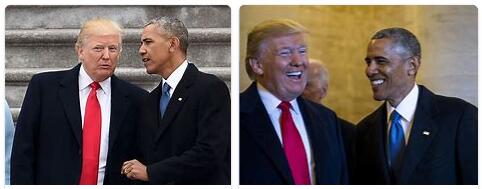United States Politics – From B. Obama to D. Trump
A few months after the expiry of the presidential term of GW Bush, a highly critical period for the domestic economy began, first due to the subprime mortgage crisis and the failure of many national banking groups, then to the collapse of Wall Street and international stock exchanges. accompanied by the protracted war in Iraq. In this difficult national and international situation, in November 2008, the people American elected with a large majority to the presidency the exponent of the Democratic Party B. Obama, an African American who, with an incisive media campaign, managed to instill hope for the future, impersonating, with his private affair, the realization of the American dream. On the implementation of its program, focused on supporting employment, on tax relief for families and businesses, on the introduction of forms of welfare, including mutual assistance, on public investments in infrastructures, on investments in the production of renewable energy the prolongation of the economic crisis, with a worrying rise in unemployment, and the rekindling of hostilities on the front in Afghanistan and Iraq, which in 2010 required the dispatch of another 30,000 men, weighed heavily. Another cause for concern in 2010 was the environmental disaster caused by the sinking of an oil rig in the Gulf of Mexico. In the following years, despite the successes both in domestic politics with the bailout of the auto industry and the approval of the health reform in 2010 and those in foreign policy with the killing of O. Bin Laden and the end of the war in Iraq in 2011, the worsening of the economic crisis and the rise in unemployment have negatively affected the popularity of the president who in 2012 reapplied for a second term against the Republican candidate WM Romney. After a tough election battle, despite the persistent global economic crisis, Obama was reconfirmed in the White House for another four years, winning the November 2012 election against the Republican candidate. In November 2014, the mid-term elections saw Republicans prevail in both houses of Parliament; the democratic defeat was interpreted as a rejection of Obama’s policy, despite the recovery of the economy, little interventionist internationally and internally due to the uncertain launch of the health reform and the failure to renew immigration laws.
In the following two years, on the other hand, a new, multilateral and dialoguing foreign policy emerged better, which was able to obtain results more with diplomacy and pragmatism than with military force: in this sense, the historic thaw in 2015 should be mentioned. between the US and Cuba, whose diplomatic relations had been suspended since 1961, and the nuclear agreement with Iran and, in 2016, the Paris climate agreement, preceded by the 2014 bilateral agreement with China. Crucial issues such as the Libyan crisis, Russia’s new interventionism, the Syrian conflict and the rise of IS, against which the US have launched military campaigns since 2014, bombing the strongholds controlled by the Caliphate and, in parallel, increasing the supply of weapons and assistance to the moderate forces in the field. At the end of eight years in office, Obama’s presidency – thanks above all to the recovery of the economy, which has returned to health due to the counter-cyclical policies of Obama after the difficult post-financial crisis period – therefore seems in a global sense to have garnered broad consensus, obtaining the approval of 45% of Americans, although crucial issues have remained open such as the resurgence of racial tensions that have never subsided, often associated with profound economic inequalities, the continuing blockade of immigration reform and above all the internal crisis generated by repeated institutional clashes with the opposition. This has produced a loss of confidence in the government in the voters and led to populist anti-establishment forces appearing on the political scene, materializing in the figure of the Republican candidate, the tycoon D. Trump, who was elected 45th in the presidential elections held on 8 November 2016. US president obtaining 47.8% of the votes against the 47.4% awarded by the democratic candidate H. Clinton; control of the House and Senate also remained with the Republican Party. Taking office on 20 January 2017 in a climate of social tension that resulted in numerous street protests, the new president reiterated in his inaugural speech some strong themes of the clearly nationalist political program presented in the electoral campaign, such as, among others, a vigorous protectionist shift in the field economic,



